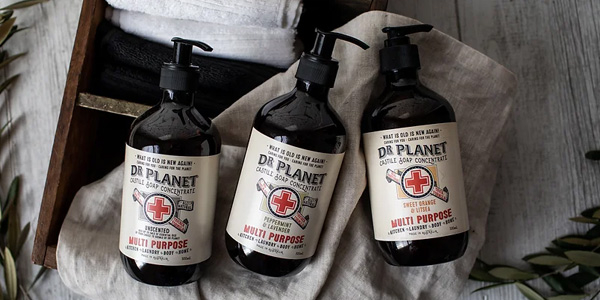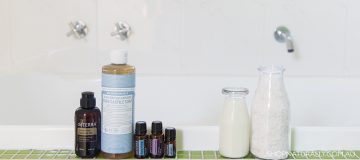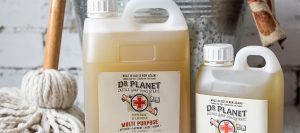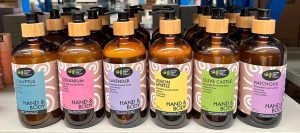Castile Soap - pure liquid castile soap and soap bars
Castile soap is one of the most versatile natural cleaning products in our store. It can be used as a household cleaner for a multitude of tasks and it's also safe enough to use for personal care and is most commonly used as a liquid body wash. Best of all, it's suitable for sensitive skin and sensitive noses can use the unscented version of liquid soap while those who like scented products can use the scents that contain essential oils in them. It's also vegan and cruelty free, and having a bottle of pure castile soap in your home can replace over a dozen other cleaning products. It can be created in soap bars or in liquid form, and as a liquid, it's one of the most versatile products in our store.
How is castile soap made?
In very simple terms, this vegetable derived liquid soap is saponified vegetable oil. Potassium hydroxide lye is mixed with the vegetable oils and purified water. Once complete, there is no lye left in the liquid soap.
Is castile soap concentrated?
Yes, liquid castile soap is highly concentrated. You can't compare the price to a regular hand wash or body wash. You can either just use a small amount when you use it or pre-dilute it yourself in a pump or foaming pump bottle. Dr Bronner's recommends some of the following dilution ratios. 1:10 ratio for dishwashing liquid, 1/2 tablespoon in the palm of your hand for shampoo, 125ml (half a cup) in a bucket for mopping floors, 60ml in a spray bottle for an all purpose spray, 1/4 teaspoon in a large bowl of water for fruit & veg wash, 2 drops in the palm of your hands for a face wash.
What can you use castile soap for?
Here's our top hacks for using pure castle soap in your home and how it can replace a lot of different products.
- In the bathroom - dilute and use it for an all over body wash or hand soap, lather and use as a shaving cream substitute. Use it to clean makeup brushes. Use it as a toilet cleaner.
- In the kitchen - a fruit & veg wash, dishwashing liquid, dilute for a spray and wipe style cleaner in a spray bottle, you can even use Dr Planet in the dishwasher. Mop the floor.
- In the laundry - washing machine as a part of a DIY hack to make your own laundry powder. Spot clean clothes, stain remover.
Is your castile soap palm oil free?
Our Dr Planet Castile Soap is 100% palm oil free. It contains only saponified olive oil, castor oil, coconut oil, water, salt, and if it's scented, essential oils. Dr Planet is also vegan.
Dr Bronners is not palm oil free. However, they control their own palm oil plantations and guarantee that there is no damage to Orangutan habitats which is the issue with unregulated palm oil. They have partnered with Natural Habitats and it comes from Ecuador. We do not believe in a blanket ban on palm oil when it has such a high yield and a company like this goes to such lengths to produce the raw ingredient ethically. The ingredients in Dr Bronner's are water, coconut oil, potassium hydroxide, palm kernel oil, olive oil, hemp oil, jojoba oil, citric acid, tocopherol and essential oils if it's scented.
Is your castile soap made in Australia?
Dr Planet is an Australian brand, made in Australia using saponified extra virgin cold pressed olive oil from Victoria. If you want to support Australian brands, Dr Planet is your top pick.
Dr Bronner's is an earth savvy, morally aware company based in the USA. They do leave a larger footprint on the planet because they are made in the USA and freighted into the country in bulk.
What shouldn't you do with castile soap?
- Don't use it on coloured hair - whether it's a natural henna hair dye or a chemical hair colour, castile soap will more than likely start stripping the colour out.
- Don't mix acids with it - vinegar and lemon juice are common ingredients in DIY cleaning products but don't mix either of them with castile soap. They cancel each other out and leave a film behind. That being said, sometimes castile soap can leave some salt deposits behind and following it with a wipe down of a lemon juice or white vinegar diluted solution is very effective, just don't mix them together.
- Don't be too heavy handed when cleaning plants - liquid castile soap is a great alternative to chemical insecticides, but using too much will strip the plant of the waxy coating it has to protect itself. This can lead to them actually being more vulnerable. Monitor carefully and dilute further if necessary to make a weaker solution.


Castile soap is one of the most versatile natural cleaning products in our store. It can be used as a household cleaner for a multitude of tasks and it's also safe enough to use for personal care and is most commonly used as a liquid body wash. Best of all, it's suitable for sensitive skin and sensitive noses can use the unscented version of liquid soap while those who like scented products can use the scents that contain essential oils in them. It's also vegan and cruelty free, and having a bottle of pure castile soap in your home can replace over a dozen other cleaning products. It can be created in soap bars or in liquid form, and as a liquid, it's one of the most versatile products in our store.
How is castile soap made?
In very simple terms, this vegetable derived liquid soap is saponified vegetable oil. Potassium hydroxide lye is mixed with the vegetable oils and purified water. Once complete, there is no lye left in the liquid soap.
Is castile soap concentrated?
Yes, liquid castile soap is highly concentrated. You can't compare the price to a regular hand wash or body wash. You can either just use a small amount when you use it or pre-dilute it yourself in a pump or foaming pump bottle. Dr Bronner's recommends some of the following dilution ratios. 1:10 ratio for dishwashing liquid, 1/2 tablespoon in the palm of your hand for shampoo, 125ml (half a cup) in a bucket for mopping floors, 60ml in a spray bottle for an all purpose spray, 1/4 teaspoon in a large bowl of water for fruit & veg wash, 2 drops in the palm of your hands for a face wash.
What can you use castile soap for?
Here's our top hacks for using pure castle soap in your home and how it can replace a lot of different products.
- In the bathroom - dilute and use it for an all over body wash or hand soap, lather and use as a shaving cream substitute. Use it to clean makeup brushes. Use it as a toilet cleaner.
- In the kitchen - a fruit & veg wash, dishwashing liquid, dilute for a spray and wipe style cleaner in a spray bottle, you can even use Dr Planet in the dishwasher. Mop the floor.
- In the laundry - washing machine as a part of a DIY hack to make your own laundry powder. Spot clean clothes, stain remover.
Is your castile soap palm oil free?
Our Dr Planet Castile Soap is 100% palm oil free. It contains only saponified olive oil, castor oil, coconut oil, water, salt, and if it's scented, essential oils. Dr Planet is also vegan.
Dr Bronners is not palm oil free. However, they control their own palm oil plantations and guarantee that there is no damage to Orangutan habitats which is the issue with unregulated palm oil. They have partnered with Natural Habitats and it comes from Ecuador. We do not believe in a blanket ban on palm oil when it has such a high yield and a company like this goes to such lengths to produce the raw ingredient ethically. The ingredients in Dr Bronner's are water, coconut oil, potassium hydroxide, palm kernel oil, olive oil, hemp oil, jojoba oil, citric acid, tocopherol and essential oils if it's scented.
Is your castile soap made in Australia?
Dr Planet is an Australian brand, made in Australia using saponified extra virgin cold pressed olive oil from Victoria. If you want to support Australian brands, Dr Planet is your top pick.
Dr Bronner's is an earth savvy, morally aware company based in the USA. They do leave a larger footprint on the planet because they are made in the USA and freighted into the country in bulk.
What shouldn't you do with castile soap?
- Don't use it on coloured hair - whether it's a natural henna hair dye or a chemical hair colour, castile soap will more than likely start stripping the colour out.
- Don't mix acids with it - vinegar and lemon juice are common ingredients in DIY cleaning products but don't mix either of them with castile soap. They cancel each other out and leave a film behind. That being said, sometimes castile soap can leave some salt deposits behind and following it with a wipe down of a lemon juice or white vinegar diluted solution is very effective, just don't mix them together.
- Don't be too heavy handed when cleaning plants - liquid castile soap is a great alternative to chemical insecticides, but using too much will strip the plant of the waxy coating it has to protect itself. This can lead to them actually being more vulnerable. Monitor carefully and dilute further if necessary to make a weaker solution.









